Stumbling upon "the Black Pearl" (Part II)
How disputes about Atlantic Beach’s future have instead mired it in the past
Last week, we explored how I stumbled upon Atlantic Beach last December, one of the only South Carolina beaches that black Americans could visit during the Jim Crow era. We walked through Atlantic Beach’s history from its peak in the 1940s through its decline after a devastating hurricane and desegregation.
We left off with my eleven-year-old son, Hudson, and I walking up North Myrtle Beach to explore the four-block cutout of Atlantic Beach. You can read part I here.
As Hudson and I approached Atlantic Beach, the relentless line of beachfront high-rises and hotels came to a football field-length pause. A handful of houses dotted the landscape. Otherwise, the most visible landmarks were wooden power poles standing behind the dunes, a rare sight in beach communities today since hurricanes treat them like toothpicks.
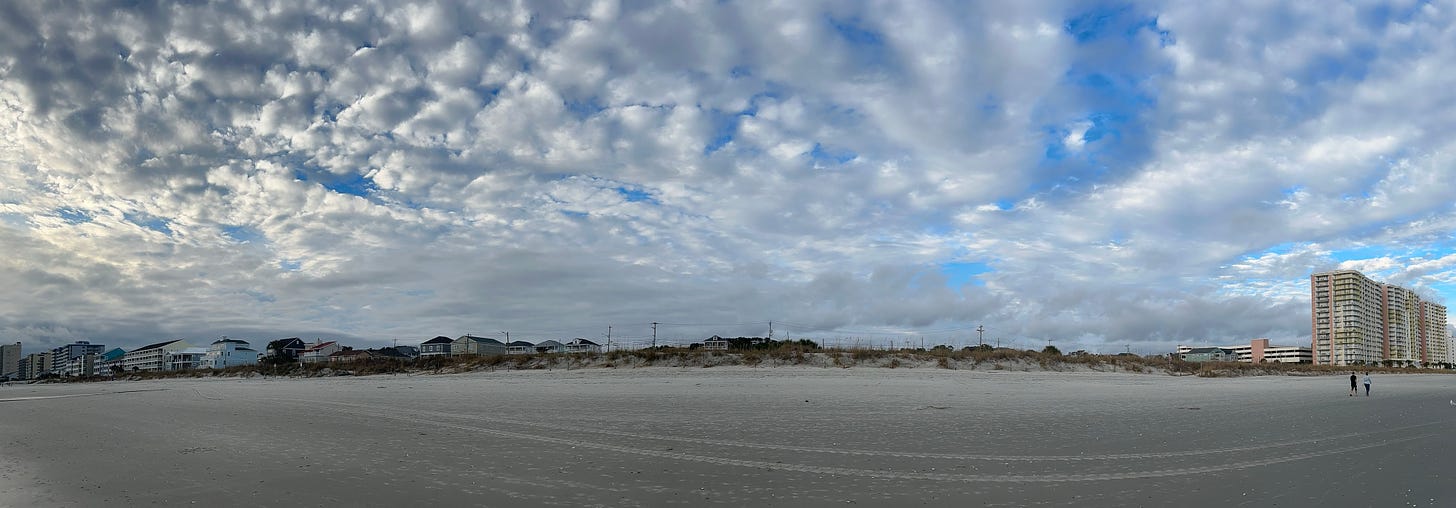
We walked between the dunes to find closely mown vacant lots for several blocks off the beach. The paved road parallel to the beachfront is also named Ocean Boulevard. Though it lines up with North Myrtle Beach’s Ocean Boulevard on both sides, it dead-ends into a private driveway on one side and the chain-link fence of North Myrtle Beach’s Baywatch Resort on the other.
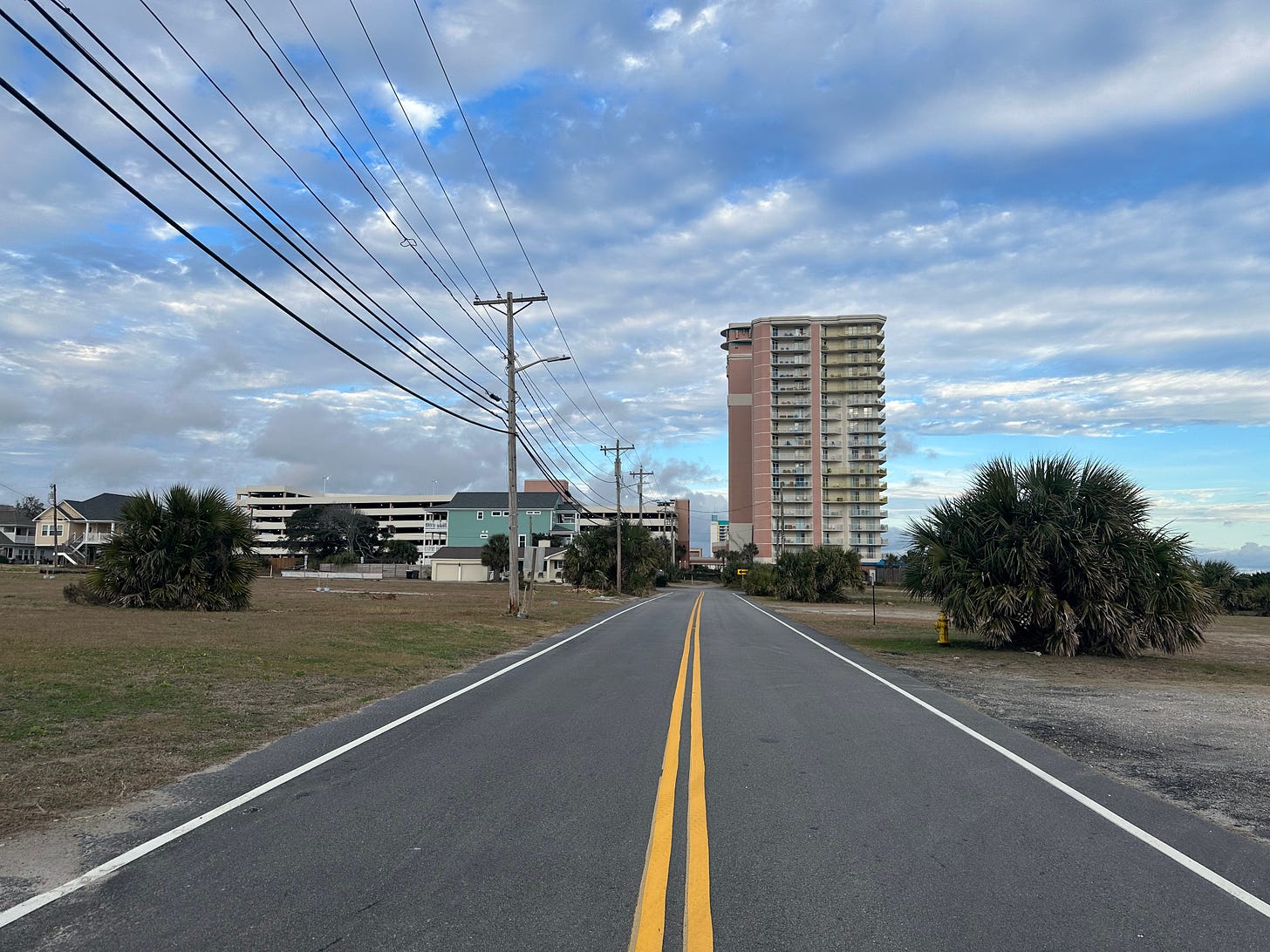
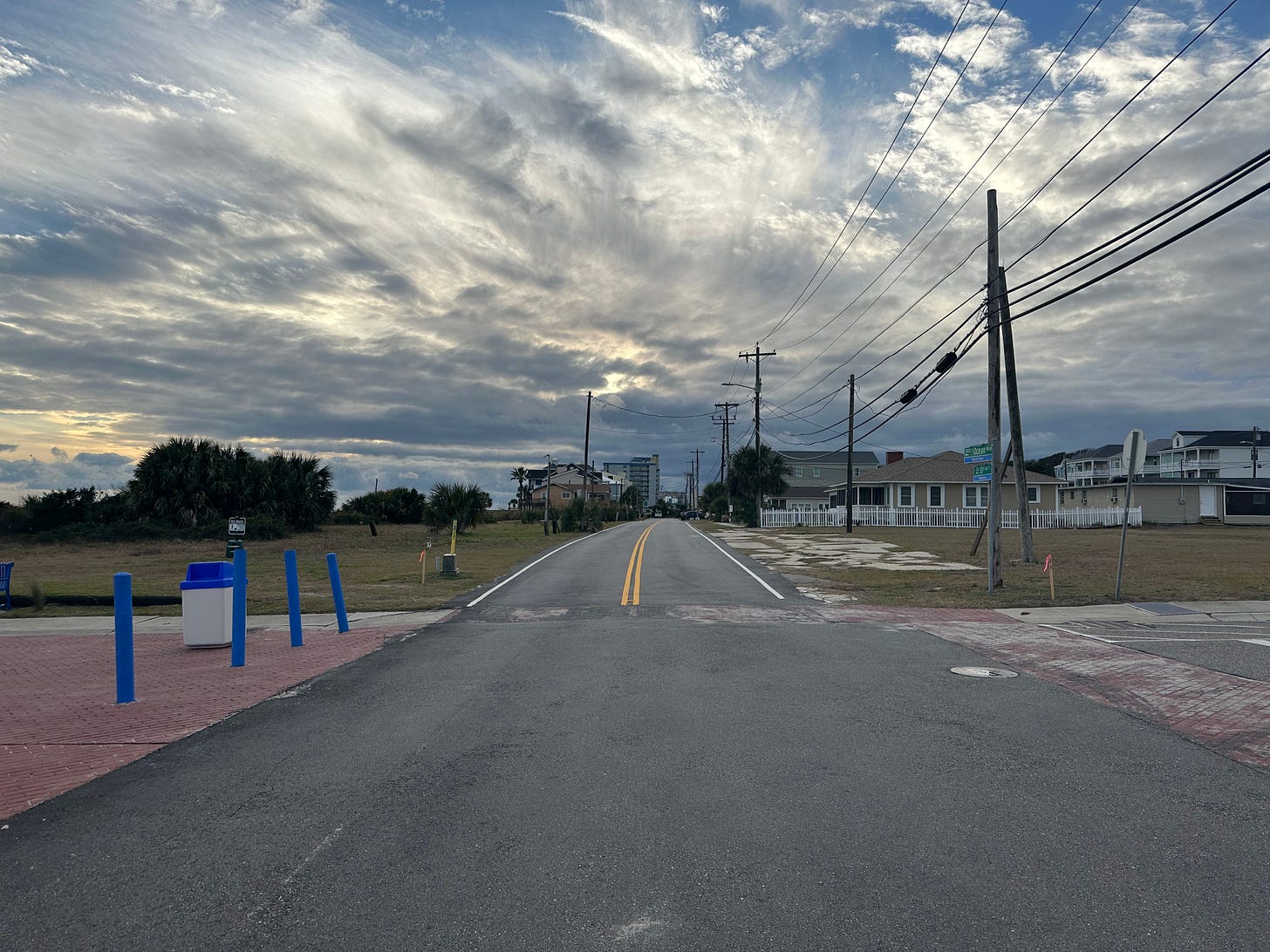
We wandered down 31st Street toward a few two-story motels, walking in the street because there were no sidewalks. The motels were operational, but they appeared frozen in the 1980s. The surrounding streets held a smattering of well-kept one-story houses alongside vacant lots that sometimes had dilapidated or overgrown structures. Several new beach houses towered over the other structures, but they were the anomaly.
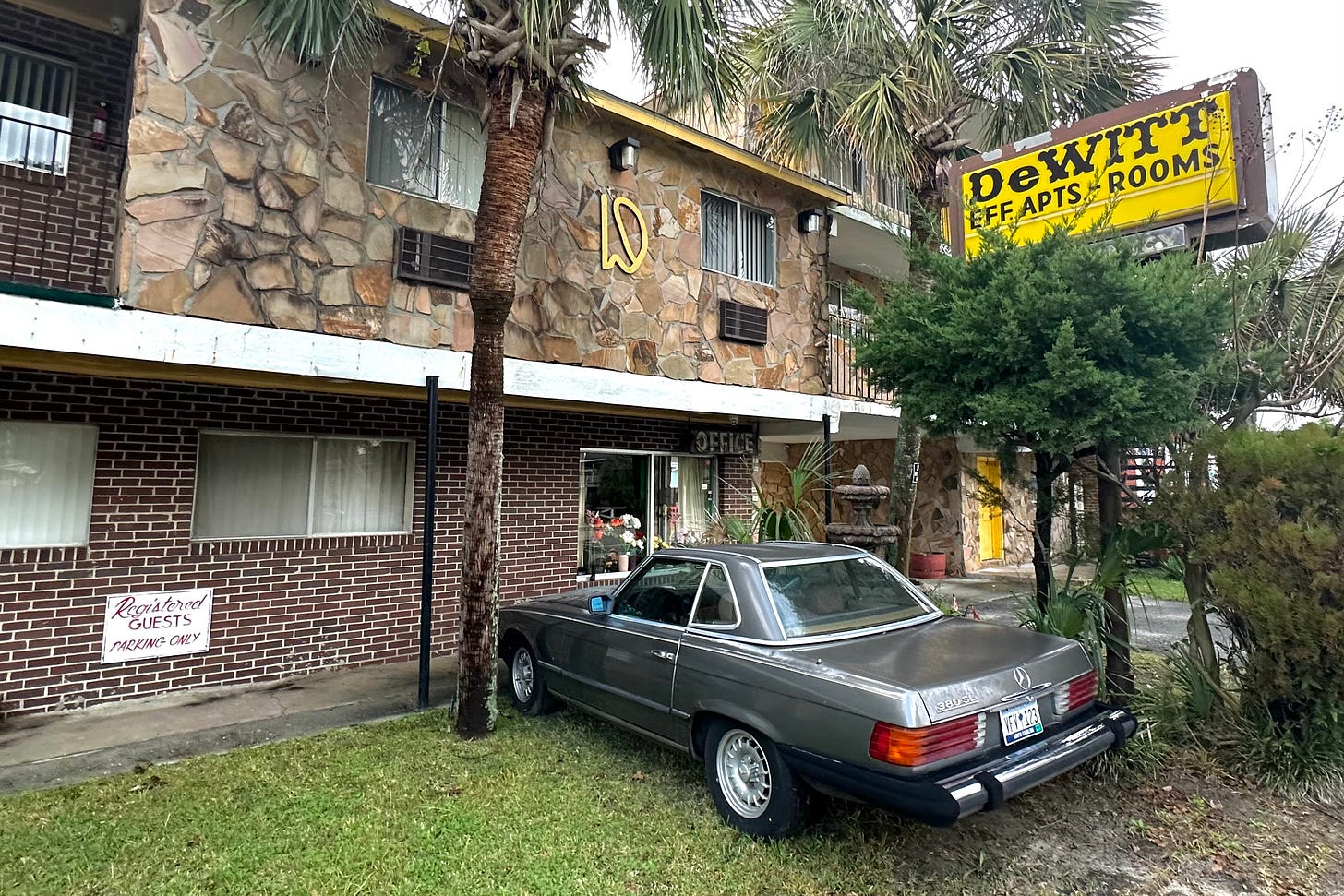
Political campaign signs were more common in yards than Christmas decorations, an unexpected sight seven weeks after the November elections. In some cases, signs for opposing candidates stood in such proximity between neighboring homes that it made me wonder what Saturday yardwork conversations were like.
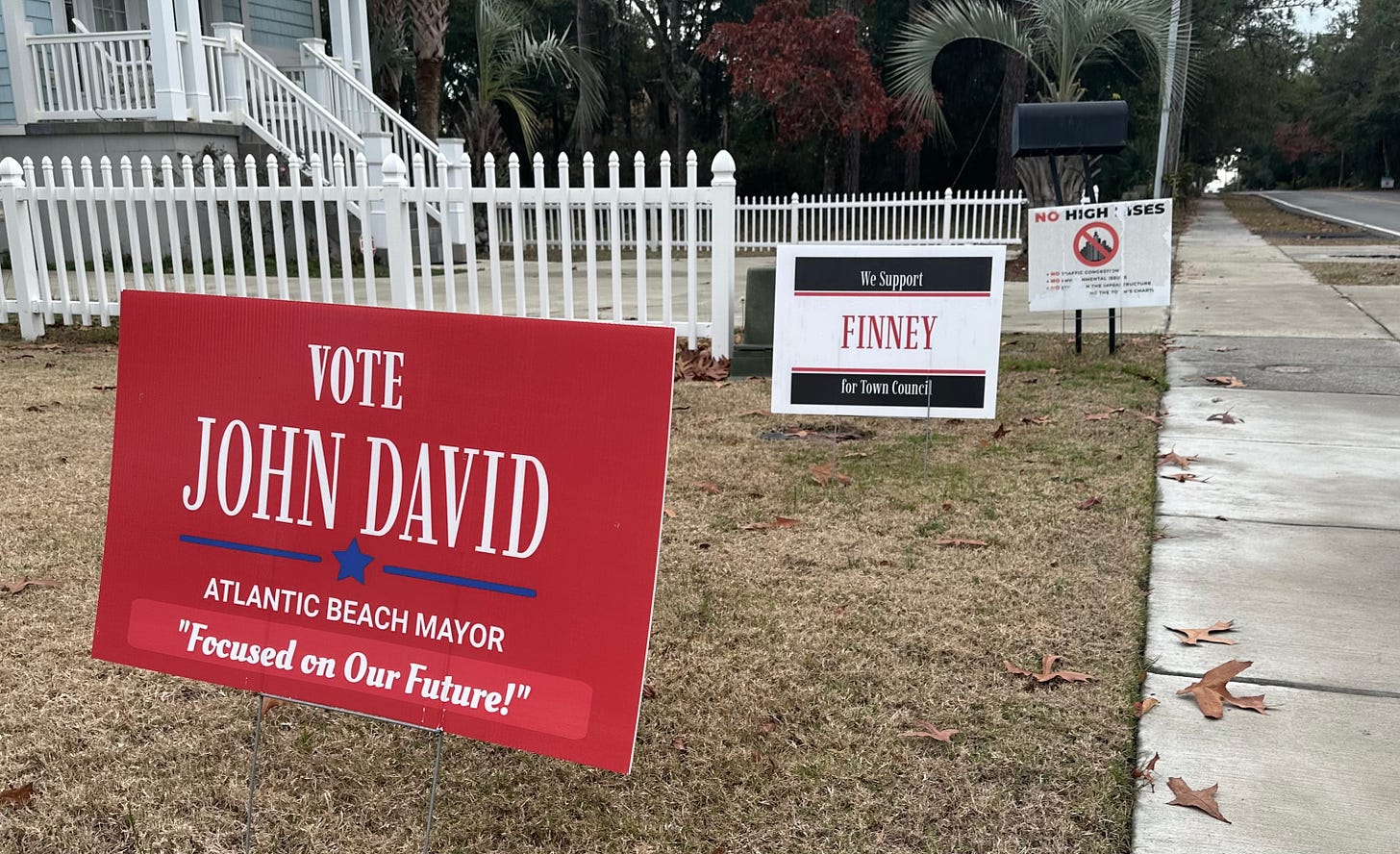
Curious again, I pulled out my phone to find out when the upcoming election would be held. I didn’t expect this search to help me understand why Atlantic Beach appeared stuck in the past.
Disagreements over how to develop Atlantic Beach stretch back decades. For example, a 1989 New York Times article describing these tensions reads much like a 2023 Washington Post article on the same dynamic.
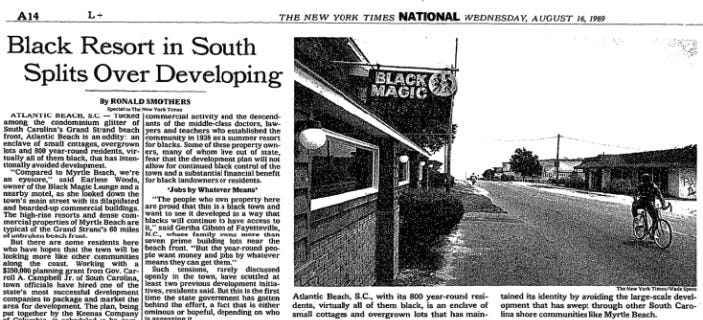
In that Washington Post article, local historian and former town council member Sherry Suttles captured this sentiment, saying:
“There’s a disconnect between the property owners and the people who actually live in Atlantic Beach. Residents want their view of the beach and are against high-rise developments on the oceanfront. As a beachgoer, I don’t like the idea of a tower blocking that sun either, but as a city and county administrator . . . I know the value of it to the community.”
Tyson’s original incorporating vision limited large-scale development, mandating that buildings couldn’t exceed three stories. Residents debate whether that policy still applies today. In addition, until last summer a town policy required developers to own the property before proposing development. The resulting lack of business development has undercut the tax revenue needed to maintain and update Atlantic Beach’s infrastructure.
These disagreements are also intertwined with seasons of severe financial mismanagement and hostile election disputes. From 2006 to 2013, the town didn’t submit its required municipal audit to the state and, at one time, had more delinquent debt than its annual budget.
The South Carolina Supreme Court has intervened so many times to adjudicate local election disputes that it stated in a 2011 ruling:
“Nearly every Atlantic Beach municipal election held in recent history has found its way to this Court. We have grown weary of the shenanigans engaged in by all parties involved in the election process at Atlantic Beach, and will not hesitate to issue sanctions if the election laws of this State continue to be blatantly disregarded.”
However, from 2014 to 2023, the town made progress toward stability under town manager Benjamin Quattlebaum. Debts were paid, audits were filed, blighted properties were cleared, and elections were held without significant disputes.
That trajectory changed in 2023 when a proposed 21-story beachfront hotel development rekindled dormant rivalries and erupted into political disputes that have left the city without an elected mayor since January.
After months of bitter debates over last November’s election, in April the town council unanimously voted to request the county government to run future elections, including a rerun of the current mayoral race. Two of the five council members are the opposing mayoral candidates from November’s election. [It’s quite a story of one-vote margins, residency challenges, and nepotism. If you’re a political nerd like me, you can read more details in the footnotes below.]1
While there is a path forward for fairer future elections, the town will have to chart its next chapter without its town manager, Benjamin Quattlebaum, who resigned in early April. His resignation letter stated that he plans to return to consulting, but it’s hard to imagine the current chaos didn’t contribute to his decision.
I felt conflicted as I learned a more complete picture of Atlantic Beach’s story. The last thing Atlantic Beach residents need is some white guy from Georgia who just learned about their town editorializing about what they should or shouldn’t do.
Today’s interrupted Ocean Blvd serves as a geographic reminder of the fences erected on either side of Atlantic Beach to keep black beachgoers from crossing into white beaches. Atlantic Beach’s undeveloped coastline is an oasis amidst North Myrtle Beach’s commercialism, but it’s also the fruit of decades of dysfunction. Its separate identity and inability to find consensus on development have increased costs and undercut the tax revenue it needs to thrive.
At the same time, if Atlantic Beach had consolidated into North Myrtle Beach like neighboring towns in 1968, high-rise condos and hotels would have paved over its rich history. Instead of locals having to reclaim Atlantic Beach’s story after decades of unrelated development, its vacant space provides a blank canvas on which they can paint its story for future generations.
If they can finally turn that corner, then perhaps someday Ocean Boulevard’s detour around Atlantic Beach can instead become a path through the widespread amnesia of America’s segregated past.
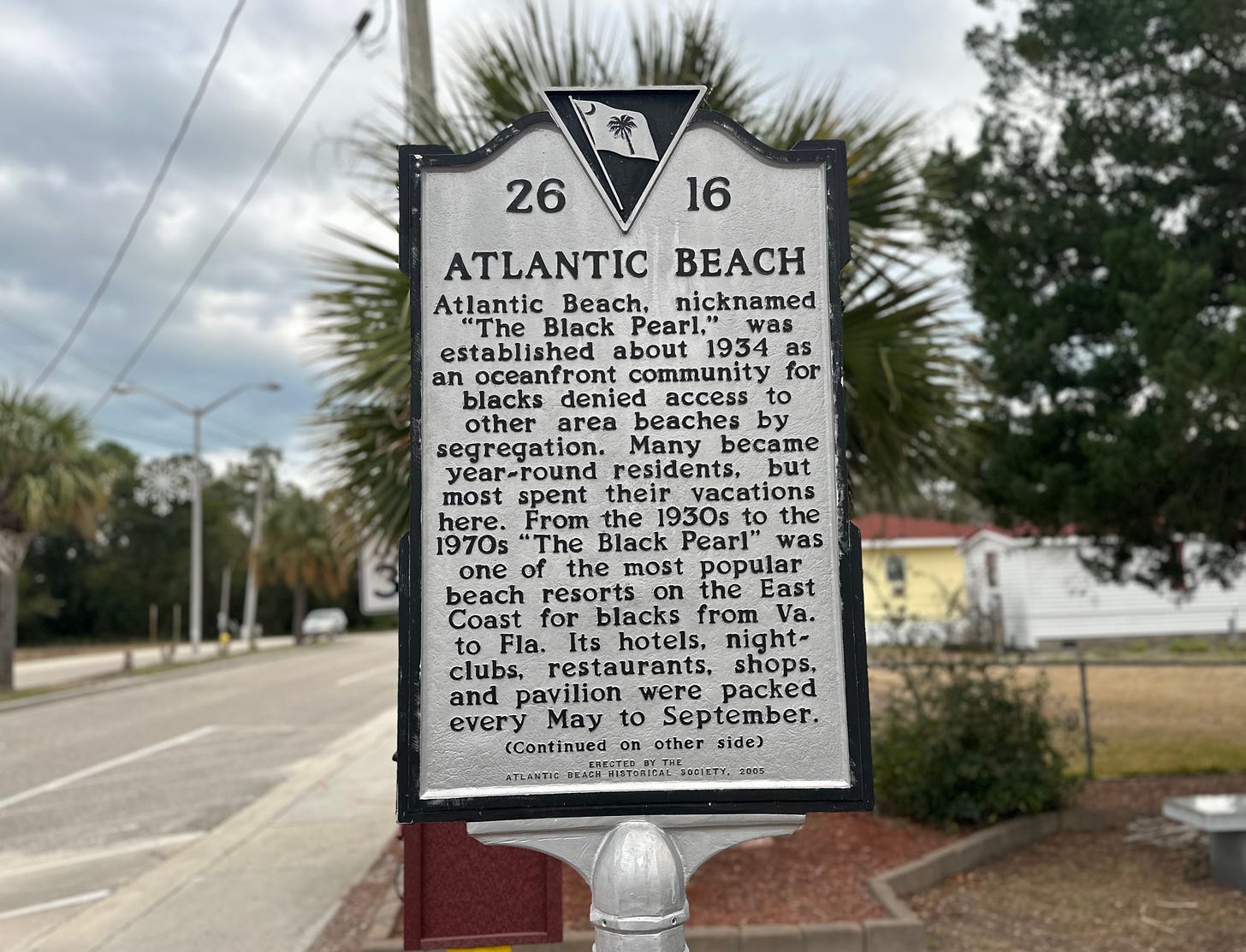
Thank you for reading Southbound. If you liked this article, please click the ♥️ icon at the bottom of this post, leave a comment, or forward it to a friend. Doing so provides me with helpful feedback and helps others find the article.
On a personal note, one year ago my wife and I left for central Florida to adopt our third son, Luke. I’ve provided several updates on Luke in prior Southbound posts over the last year. If you’re interested in reading my reflections on his first birthday, you can see pictures and read my Facebook post here.
Further Details on Atlantic Beach’s Recent Election Saga: The latest Atlantic Beach election controversies began in early 2023 when newcomer John David defeated Michael Isom in a special election (36 votes to 21 votes). Isom filed suit to challenge David’s residency, keeping the election in question for all of 2023. While that case bounced between courts and with Mayor Jake Evans retiring, David decided to run for mayor in the November election against town council member Josephine Isom, who also happens to be Michael’s mother.
After David won by one vote (65 to 64), Isom alleged that 18 non-resident ballots were counted, tipping the election to David. Atlantic Beach’s election commission declined her appeal and was set to certify David's election until Mayor Evans shared concerns that a court reporter should be present for the vote. The commission adjourned for lunch to allow a reporter to arrive. In the meantime, Evans called an emergency town council meeting where members voted to dissolve the election commission, leaving the election results in question.
David appealed to South Carolina’s governor and supreme court for quick intervention, to no avail. Two weeks later, the council reconstituted the commission but removed one of its members, Joe Montgomery, because it claimed he was biased toward David, despite one of the reappointed commission members, Carolyn Gore, being council member Jacqui Gore’s mother.
The commission spent the next few months debating how to handle the election results. In January, the South Carolina Supreme Court ruled in favor of David’s original case, allowing him to join the council alongside Isom as their mayoral dispute continued to play out. Meanwhile, Jake Evans has continued to serve as mayor beyond his term.




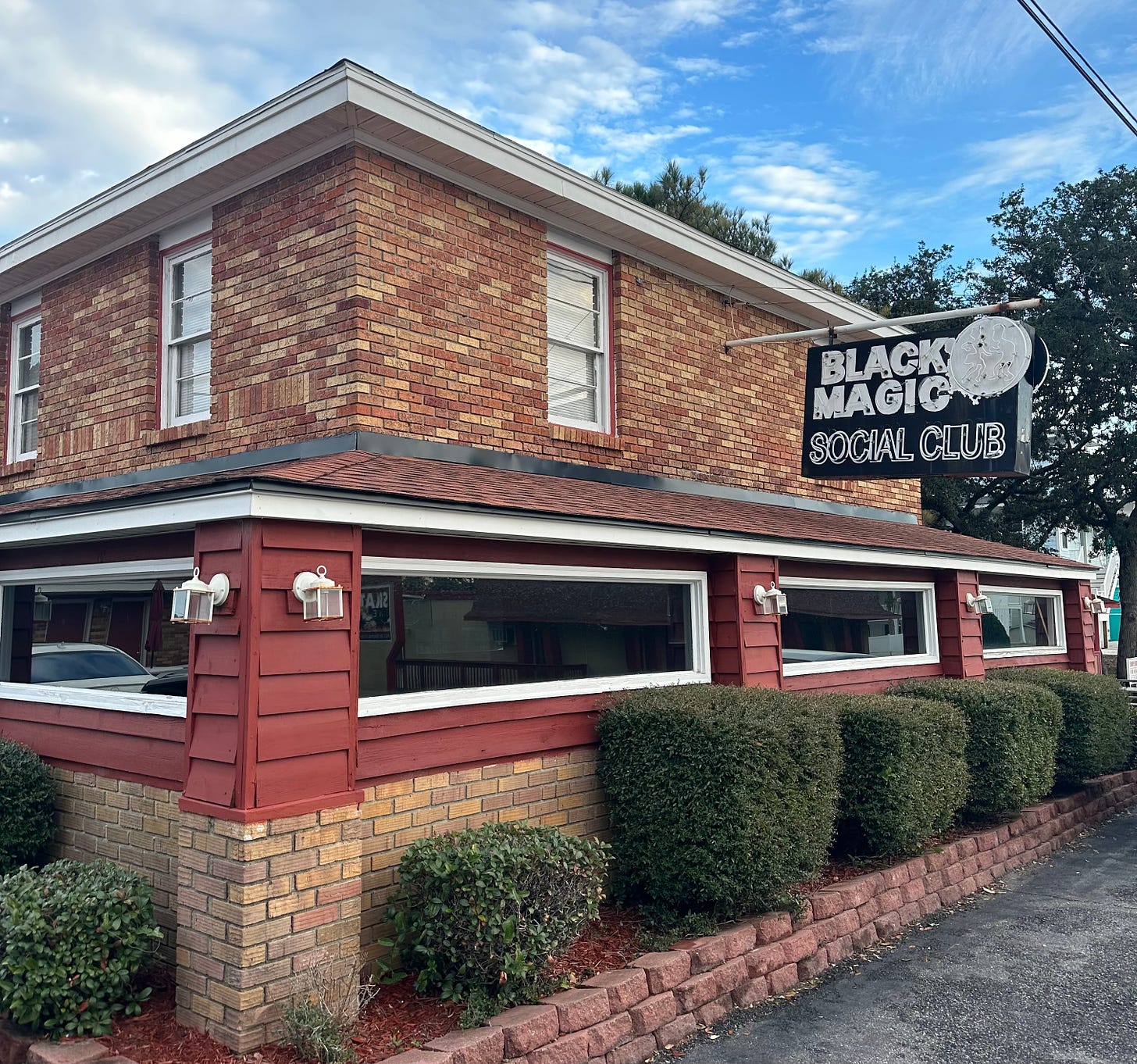
Would love to know which house you stayed in so i can share this article. I know almost every owner. I'm build a mixed use structure on 30th, the "main" street
BTW, This was my favorite part of the article:
At the same time, if Atlantic Beach had consolidated into North Myrtle Beach like neighboring towns in 1968, high-rise condos and hotels would have paved over its rich history. Instead of locals having to reclaim Atlantic Beach’s story after decades of unrelated development, its vacant space provides a blank canvas on which they can paint its story for future generations.
Sam, it’s very interesting to trace back the disagreements that happened back then and compare it to some of the issues raised today. I appreciate this prompt for me to think about some of the issues faced today.